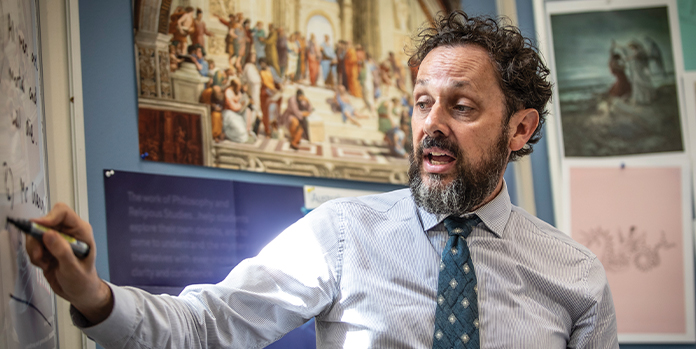Philosophy and Religious Studies has, for many years, been placed at the centre of the academic journey of our middle school students.
Students and staff must, however, approach the teaching and learning that occurs in this subject from a particular perspective – one that permits and invites a certain depth in thinking and understanding.
It is, I think, for this reason that the school has made the decision to develop the program, increasing classes at both Year 7 and Year 10, thereby enlarging the exposure students have to this perspective.
Thinking deeply and thinking well
Thinking deeply necessarily entails thinking well, just as navigating deeper waters requires increasingly refined and robust equipment. The program is thus designed to develop student thinking by helping them integrate increasing ‘shades of grey’ into their understanding of concepts and ideas.
In Year 7, for instance, students investigate the life of Jesus Christ – as both an historical and Biblical figure. They return to explore the figure of the Christ in Year 10, focusing more on Christ as Saviour, and subsequently investigate whether salvation sits at the heart of every great religious tradition.
In Year 8, students investigate different ethical theories and how they might lead us to make ‘right’ decisions in difficult circumstances; by Year 9, ethics is explored as a more consistent, integrated notion that occupies our daily lives, not just our dilemmas.
By Year 10, we teach a unit on ‘thinking well’ as a more formal process, through techniques of argument and evaluation, such that students can investigate difficult, contested concepts like freedom, justice, even religiosity, more rigorously.
From problems to mysteries
Thinking deeply can only be done, however, when the subject matter selected has sufficient depths to explore. It is, in many ways, in this space that Philosophy and Religious Studies is best placed to help students develop as deep thinkers, since philosophical and theological questions are, by definition, ‘deep’.
Perhaps a better way to put this is to draw a distinction, as French philosopher Gabriel Marcel does, between a mystery and a problem – and to notice that the domain of Philosophy and Religious Studies is essentially that of mystery.
Where a problem is something unknown, but that can be solved, a mystery is something ‘known’, yet impossible to solve or be resolved, because understanding a mystery is a forever-deepening experience. For example, what it means to be human is something clearly ‘known’ yet profoundly mysterious and ever-unfolding. Students in Year 9 are invited into this particular question through a study of different philosophical and religious responses.
Students in Year 7 explore various, famous philosophers and their big ideas as a stepping-stone into this realm of knowing, whilst those in Year 10 begin their final year in Philosophy and Religious Studies by way of the biggest mystery of all – questioning God’s existence and nature.
A personal journey of understanding
A mystery, says Marcel, is something “in which I myself am involved.” This points to a third feature of the experience of Philosophy and Religious Studies I take to be valuable. That is, the subject matter permits the students to occupy a position as a ‘knower’ in their own right. This isn’t to say they are the exclusive source of wisdom in a Philosophy and Religious Studies classroom, but it does reveal how their own insights, intuitions and observations are part of the process of discussion and exploration.
The work of Philosophy and Religious Studies, in many ways, and across all year levels, is to help students explore their own depths, and to come to understand the mystery of themselves with ever-increasing clarity and confidence.
The path of knowing, a life of wisdom, is the core ‘business’ of Philosophy and Religious Studies – and I would argue it is a way of being apt to meet the challenges of modern life, particularly that of technology and its ever-increasing influence.
Whilst technology clearly has a place in our lives, there is no doubt it has led to increasing amounts of isolation, overwhelm, triviality and the loss of self-worth. The currents of these times are, as a result, frequently chaotic.
Perhaps, as it has always been, and as the wisdom traditions we explore in this subject have always revealed, going deeper is the surest way through.
Justin Glenn (OM 1993)
Head of Philosophy and Religious Studies



